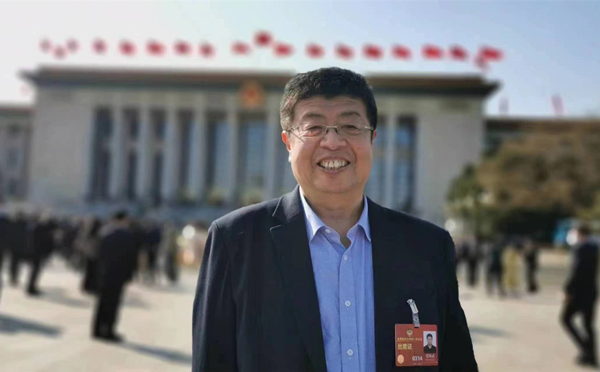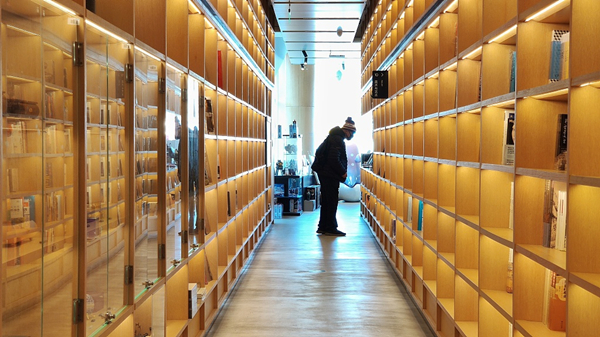A proposal to China's top political advisory body has urged support for the country's struggling physical bookstores, while a political advisor stressed their cultural significance.
Zhang Yiwu, a political advisor and a professor of Chinese studies at Peking University, poses for a photo as he attends the annual meeting of the Chinese People's Political Consultative Conference (CPPCC) in Beijing, March 4, 2023. [Photo provided to China.org.cn]
Physical bookstores have faced great difficulties in recent years due to the overwhelming shift to online book purchases, which offer convenience and low prices, according to a proposal from the Central Committee of the China Association for Promoting Democracy submitted to the first session of the 14th National Committee of the Chinese People's Political Consultative Conference (CPPCC). Moreover, physical bookstores are struggling with a lack of income and a weak online presence. The COVID-19 pandemic further exacerbated the struggle of physical stores.
According to Zhang Yiwu, a CPPCC National Committee member and a Chinese studies professor at Peking University, who is also a standing committee member of the China Association for Promoting Democracy and a participant as well as researcher for the proposal,, while state-backed bookstores and some small special bookstores selling second-hand books or textbooks may find it easier to survive, many more bookstores are still struggling in the current market.
The retail market size for books in China in 2020 was valued at 97.08 billion yuan ($14 billion), according to a China book retail market report released by Beijing OpenBook, a consulting company specializing in the book business. This marked a decline from the previous year and was partially attributed to the COVID-19 pandemic.
Meanwhile, online platforms maintained growth, accounting for 79% of the total book retail market size. Consumers' preference for online book purchases is driven by e-commerce platforms offering low discounts, coupon incentives, and other activities at the expense of profits. Publishers are also increasingly focusing on e-commerce businesses.
Additionally, a national physical bookstore operating conditions survey released by the Books and Periodicals Distribution Association of China revealed that in the first half of 2022, 9.56% of bookstores had no income, while 32.09% of physical bookstores earned less than 100,000 yuan. The cash flow problem is particularly prominent, with 34.71% of bookstores stating that their cash flow has been affected, making it difficult to continue operations.
Zhang stressed the importance of physical bookstores as cultural hubs that provide various cultural services. He noted that they play a critical role in promoting national reading, building a society of book lovers, enhancing the scientific and cultural literacy of the entire nation, and supporting the building of China into a cultural powerhouse.
He further noted that physical bookstores offer an unparalleled cultural experience that cannot be replicated online. For example, they offer a space to interact with books, meet like-minded people, attend book clubs and cultural events, and receive personalized recommendations from well-informed staff.
"Physical bookstores must be protected, and their transformation and upgrading should be supported to enhance the public's cultural consumption experience," he said, adding physical bookstores play an essential role in promoting local culture and literature. They serve as cultural landmarks and tourist attractions that attract visitors to the surrounding areas.
"One value of physical bookstores is that they are a cultural or spiritual symbol of the city's business district or commercial structure. A region's commercial development is incomplete without bookstores," he said.
A visitor looks and scans books on the shelf at a Page One bookstore in Wudaokou, Beijing, Jan. 23, 2023. [Photo/VCG]
Zhang suggests that bookstores could improve cultural quality by diversifying into cultural spaces, cultural product exchange, and activity areas. He pointed to Page One bookstores, a Singapore brand that organizes lectures, sells English books, and even collaborated with the British Museum.
"Page One has a significant impact on the region's cultural landscape," Zhang said, noting China's traditional bookstore managers could learn from their example.
The CPPCC proposal suggests measures to help physical bookstores, such as standardizing book publishing and sales prices, increasing financial and credit support, supporting the development of online businesses for physical bookstores, and guiding the optimization and transformation of the physical bookstore business model through various supportive policies.
Source: China.org.cn

